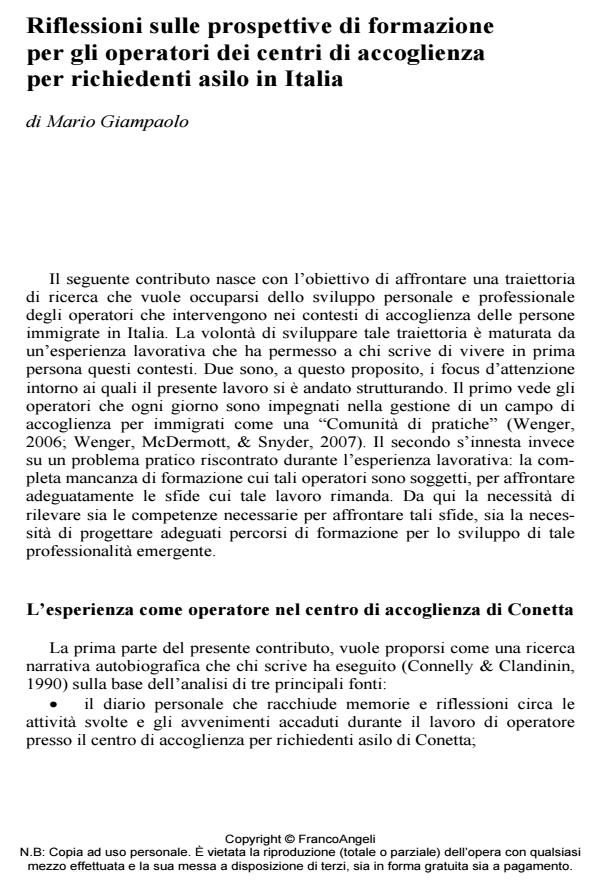Reflections about Development Perspectives of Social Workers in the Reception Centers for Immigrants in Italy
Journal title EDUCATIONAL REFLECTIVE PRACTICES
Author/s Mario Giampaolo
Publishing Year 2016 Issue 2016/2
Language Italian Pages 17 P. 109-125 File size 218 KB
DOI 10.3280/ERP2016-002008
DOI is like a bar code for intellectual property: to have more infomation
click here
Below, you can see the article first page
If you want to buy this article in PDF format, you can do it, following the instructions to buy download credits

FrancoAngeli is member of Publishers International Linking Association, Inc (PILA), a not-for-profit association which run the CrossRef service enabling links to and from online scholarly content.
During the years 2014 and 2015, the Mediterranean Sea was the theater of a huge migratory flow. Only in these two years, thousands of people left their countries for a long journey hoping to find a place, in Italy and in Europe, where to live with dignity. From November 2015 to April 2016, the work experience in the reception center for asylum seekers in Conetta, a small village in the province of Venice, allowed to identify some practices of the community (Wenger, 2006; Wenger, McDermott, & Snyder, 2007) of social workers that every day are committed to address the challenges of the reception and relate to people with a different culture. Founded at the end of July 2015, the center, one of the largest in the north-east of Italy, hosted more than 500 immigrants from Africa and Asia. The second part of the work identifies, thanks to an initial literature review of institutional and academic sources, three models of competencies needed for the development of this professional involved in the management of migratory flows. Starting from the identified competency models and the experience of participation in the community of social workers, the work suggests some core themes and methodologies for the design of development programs.
- Servizio Centrale del Sistema di Protezione per Richiedenti Asilo e Rifugiati. (2015). Manuale operativo per l’attivazione e la gestione dei servizi di accoglienza e integrazione per i richiedenti ed i beneficiari di protezione internazionale. Recuperato da http://www.sprar.it/index.php?option=com_k2&view=item&id=121:online-il-manuale-operativo-sprar-2015&Itemid=557 [ultimo accesso 01/11/2016].
- Taylor, E. W. (2009). Fostering transformative learning. In Mezirow, Taylor, and Associates (Ed.). Transformative learning in practice: Insight from community, workplace, and higher education. (pp. 3-17) San Francisco: Jossey-Bass.
- Wenger, E. (2006). Comunità di pratica. Apprendimento, significato e identità. Milano: Raffaello Cortina Editore.
- Wenger, E., McDermott, R., & Snyder, W.M. (2007). Coltivare comunità di pratica. Prospettive ed esperienze di gestione della conoscenza. Milano: Guerini e Associati.
- Argyris, C. & Schön, D.A. (1998). Apprendimento organizzativo. Teoria, metodo e pratiche. Milano: Guerini e Associati.
- Boccuzzo, G. & Grassia, M. G. (2008). Attività, competenze e professionalità nei servizi agli immigrati: analisi di due realtà italiane. In S. Balbi, G. Boccuzzo, & M.G. Grassia (a cura di), Profili formativi e bisogno di competenze nel terzo settore (pp. 37-81) Padova: CLEUP.
- Budwig, N. (2015). Concepts and tools from the learning sciences for linking research, teaching and practice around sustainability issues. Current Opinion in Environmental Sustainability, 16, 99-104.
- Connelly , F.M., & Clandinin, D.J. (1990). Stories of experience and narrative inquiry. Educational Researcher, 19(5), 2-14.
- Creswell J. W. (2008). Educational Research. Planning, Conducting, and Evaluating Quantitative and Qualitative Research. Upper Suddle River, New Jersey: Pearson Education.
- Fabbri, L. (2007). Comunità di pratica e apprendimento riflessivo. Per una formazione situata. Roma: Carocci.
- Fabbri, L., Striano, M., & Melacarne C. (2008). L'insegnante riflessivo. Coltivazione e trasformazione delle pratiche professionali. Milano: Franco Angeli
- Fabbri, L. (2015). La competenza riflessiva. In L. Perla, & M. G. Riva, (a cura di), L’agire educativo. Manuale per educatori professionali e operatori socioassistenziali. Roma: Editrice Lascuola (pp. 230-245)
- Fedeli, M.(2014) Apprendimento riflessivo. In S. Pastore, & D. Lipari (a cura di), Le Nuove Parole della Formazione. Roma: Palinsesto.
- Gaudio, F. & Caramelli, E. (2009). Volontariato e immigrazione: profili, competenze, fabbisogni formativi. Autonomie locali e servizi sociali, 3, 465-474.
- Henschke, J. A. (2011, November). Trust in learning makes all the difference; If absent, Nothing else makes a difference. Paper session presented at American Association for Adult and Continuing Education Conference, Indianapolis.
- Knowles, M. S., Holton, E. F. III, & Swanson, R. A. (2005). The adult learner (6th ed.). San Francisco: Berrett Koehler Publishers, Inc.
- Melacarne, C. (2011). Apprendimento e formazione nella vita quotidiana.Sull’identità del professionista dell’educazione. Napoli: Liguori Editore.
- Mezirow, J. (1991). Transformative dimensions of Adult learning. San Francisco: Jossey Bass Press.
- O’Neil, J. & Marsick, V.J. (2007). Understanding action learning. Theory into practice. New York: Amacom.
Mario Giampaolo, Riflessioni sulle prospettive di formazione per gli operatori dei centri di accoglienza per richiedenti asilo in Italia in "EDUCATIONAL REFLECTIVE PRACTICES" 2/2016, pp 109-125, DOI: 10.3280/ERP2016-002008